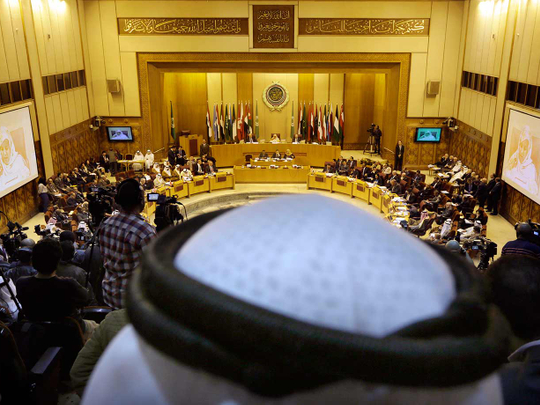
Dubai: You can expect a sense of similarity with next week’s Arab League summit and several summits held in the past: There will be no stabilisation in sight to end the wars and conflicts sweeping Arab nations; and there will be no consensus on the myriad issues on table. And even if there happens to be an agreement, there will be no mechanism to implement it.
But for all of the similarity, there’s also one unexpected unfamiliarity — Mauritania, the setting.
“The summit was supposed to be held in Morocco,” explains Mohammad Saeed Idris, a consultant at Cairo-based Al Ahram Strategic Studies Centre and former Egyptian parliamentarian. “But Rabat declined to host it because the summit has an agenda that offers no answers to core Arab issue.” And because of that, Idris told Gulf News, Morocco feared the gathering might be a purely cosmetic affair.
“Morocco could not find any intent among the Arab League officials to host a real summit, so it declined,” Idris said.
Instead, the summit is scheduled to be held now in Nouakchott, the capital of Mauritania next Tuesday and Wednesday. It will be the first time the summit is being hosted by the little-known African nation.
Originally, the summit was supposed to have been held in Marrakesh on March 29. That was postponed to April 7 at the request of Saudi Arabia. Then Morocco refused to host the gathering.
“Amid the lack of important decisions and concrete initiatives to submit to the heads of states, this summit will be just another occasion to approve ordinary resolutions and to pronounce speeches that give a false impression of unity,” a statement from the Moroccan foreign ministry noted.
“Arab leaders cannot confine themselves, once more, to simply analysing the bitter situation of divergences and divisions without giving decisive responses,” it added.
After Morocco’s decision, “Arabs faced the predicament of cancelling or postponing the summit or holding it in the headquarters of the Arab League in Cairo,” Idris said.
While it is not immediately clear the level of participation from different Arab countries and whether it is going to be at the level of heads of state, prime ministers or ministers, other analysts expressed pessimism that no crucial decisions will come out of the meeting.
“Whether there is a high level of participation or not, the summit will be in the same league of previous summits,” said Jeddah-based political scientist Waheed Hamza Hashem.
“The summit will not take any influential decisions, and in case such decisions are adopted, they won’t be implemented as there is no implementation mechanism anyway,” Hashem told Gulf News.
“There is no [Arab] consensus on any of the issues on the table,” Hashem said, “Arabs have proven since 1945 that they have agreed on not to agree.”
The Arab League was formed in Cairo on March 22, 1945 with six members — Egypt, Iraq, Transjordan (renamed Jordan in 1949), Lebanon, Saudi Arabia and Syria. Yemen then joined as a member on May 5, 1945. Syrian membership was suspended in 2011 after the eruption of the civil war there.
“There must be a unified Arab position vis-a-vis the disunity of Arab countries and the procrastination in reaching a solution to the Palestinian question and the two-state solution,” Idris said.
Apart from the Palestinian question, other issues expected to be discussed include the situation in Syria, Iran’s meddling in Arab affairs, and terrorism.
“The closer the location (of holding the Arab summit) to Occupied Jerusalem and Al Aqsa Mosque, the more attention is given to Jerusalem and Al Aqsa,” said Mahdi Abdul Hadi, founder of the Palestinian Academic Society for the Study of International Affairs (PASSIA) in Occupied Jerusalem.
“The further the place, the further the priorities are from the Palestinian question,” added Hadi.
He said the Palestinian question is the core of all crises and conflicts in the Middle East and it needs to be solved.
Arab nationalism is in crisis and the Arab system is collapsing, Hadi told Gulf News. Yet, the Palestinian people will not give up despite all the shocks they have endured, he stressed.
“I hope all leaders will attend the summit in Mauritania,” Idris added. “It will be a summit to prove the existence of Arab nationalism or ... we will lose everything.”












